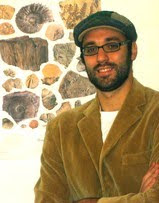More than 300 million of
years ago, during the Carboniferous period, humongous insects and
gigantic amphibians populated vast, swampy forests. These
inextricable habitats originated vast deposits of coal – from which
the name Carboniferous – and, in much more recent times, they
inspired the creativity of artists.
Among the artworks
inspired by this geologic period, the wax habitats of Kenneth Parsons are
some of the most awe-inspiring creations. Abstract but
representational at the same time, these environments take the
visitor into the intricate atmospheres of the Carboniferous period.
Wax is the vehicle of chronological exploration and kaleidoscopic
patterns are its language. In fact, the artist created a geologic
narrative entirely sculpted in wax, and experimented with
illumination to obtain a totally immersive experience.
More in detail, there are
two Carboniferous forests - one is a wall in 'The Wax Room' which was
exhibited at the Edinburgh Festival and Wolverhampton Art Gallery and
one is a geodesic dome which was specially commissioned and
exhibited, as part of a tour called 'Forest' at York, Nottingham and
Newtown Art Galleries. The exhibition spaces were covered by thin
sheets of wax, permeable to light, designed in 30 years of work.
I interviewed Ken Parsons about his peculiar and inspiring form of art.
At what age did you
become an artist, and how did you know?
Made and painted a large
box when I was 15 but I suppose it all started when I was about 8. My
mother had to work so left me alone when I was off school with
asthma. We had some very old lead toy cars. I would light a fire in
the grate put the cars on a shovel and watch them melt into a
beautiful silver puddle – then I would pour the molten lead into a
glass of cold water and hey presto – lots of lovely shiny abstract
shapes.
Wax sculpture is a very
peculiar form of art. What career path did you take to get to where
you are now?
Studied for a degree in
Geography at Exeter University, dropped out and taught myself.
What inspired you to
create the Wax Room? What were your goals?
Love stained glass windows
– a room made of stained glass/wax seemed like something I would
really love to see…
Why have you chosen a
Carboniferous Forest?
Mandala type designs can
easily be interpreted as trees and the wax comes from the
Carboniferous era so hey!
 |
| Particular of the Carboniferous Forest. |
Please give us some
insight on your journey in making this artistic project.
Long hours (3000) tricky
problems to solve, 2 good fellow workers, scraping up money to pay
for it.
Carboniferous forests
are not the only geologic element inside the Wax Room. What is the
role of volcanoes and lava in your artwork?
They are part of the
narrative from the big bang to the formation of the earth.
Sculpture, sound,
vision... Please explain the narrative of the Wax Room.
3 narratives – one a
philosophic concept of splitting and bringing together, another a
geography lesson for kids and another about the creation of the Wax
Room
Wax and Carboniferous
Forests are the axis of your “Wax Room” and “Wax Dome”. What
is the (emotional) role of these elements in your artistic
creativity?
Very forgiving and plastic
material, love gardening and nature.
The Wax Dome: What
media, what artistic metaphors have you used?
Time in a day and
stretching through countless days.
What is the concept
behind the Wax Dome?
Rebirth of the dead
material in wax to glow again with the light of the sun that created
it.
 |
| A review of the Wax Dome, from the official website. |
The Wax Dome as an
experience: is it a progression or a static experience?
Progression through a day
in the Carboniferous era using different lighting.
Do you think your work
reflects a specific fractal look?
Mandalas are a favourite
Jungian motif and his concept of the collective unconscious is
reflected in the connectivity in fractal patterns in say leaves and
deltas, ammonite shells and galaxies.
How important do you
think it is for artists to know about geology?
Just as important as any
knowledge
What projects are you
working on now, and what do you have in line for the future?
Lampshades and trying to
find homes for the Wax Room and the Wax Dome.







No comments:
Post a Comment